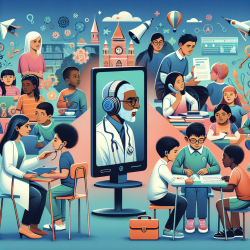Introduction
In the realm of stroke rehabilitation, the quest for effective and evidence-based interventions is a continuous journey. The research article titled Expected Health Benefits as the Ultimate Outcome of Information Available on Stroke Engine, a Knowledge Translation Stroke Rehabilitation Website: Web-Based Survey sheds light on how practitioners can leverage online resources to enhance their practice. This blog post delves into the findings of the study and offers insights on how practitioners can improve their skills and outcomes for patients.
The Power of Knowledge Translation
Stroke Engine, a comprehensive online resource, has been pivotal in bridging the gap between research and clinical practice. According to the study, the website receives over 10,000 visits per week, indicating its widespread use among health professionals, students, and individuals with stroke. The research highlights the importance of situational relevance, cognitive impact, intention to use, and expected patient and health benefits as key outcomes of utilizing such resources.
Key Findings and Implications for Practice
The study surveyed 6,634 respondents, including health professionals, students, and individuals with stroke. Here are some key findings:
- Situational Relevance: Health professionals and students predominantly searched for assessment-related information, while individuals with stroke and their relatives sought general information on stroke rehabilitation.
- Cognitive Impact: A significant number of respondents reported learning something new, which underscores the educational value of Stroke Engine.
- Intention to Use: The majority of respondents expressed an intention to use the information, particularly for refining knowledge, research, and educational purposes.
- Expected Health Benefits: Improvement in health and well-being was a top-ranked benefit, followed by the avoidance of unnecessary treatments.
Enhancing Practitioner Skills
Practitioners can enhance their skills by integrating the following strategies based on the study's outcomes:
- Utilize Online Resources: Regularly engage with platforms like Stroke Engine to stay updated on the latest evidence-based practices.
- Focus on Assessments: Given the high demand for assessment information, practitioners should prioritize learning about and implementing effective assessment tools.
- Encourage Patient Empowerment: Share relevant information with patients and their families to empower them in their rehabilitation journey.
- Embrace Continuous Learning: Use online resources as a tool for lifelong learning and professional development.
Conclusion
The study underscores the critical role of knowledge translation in stroke rehabilitation. By leveraging online resources like Stroke Engine, practitioners can enhance their practice, improve patient outcomes, and contribute to the overall advancement of stroke rehabilitation. For those interested in delving deeper into the research, the original paper offers comprehensive insights into the study's methodology and findings.
To read the original research paper, please follow this link: Expected Health Benefits as the Ultimate Outcome of Information Available on Stroke Engine, a Knowledge Translation Stroke Rehabilitation Website: Web-Based Survey.










